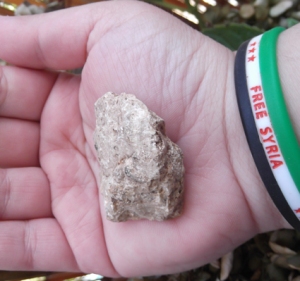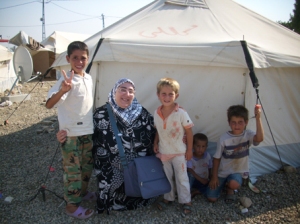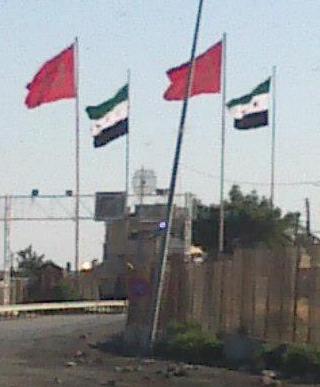 The majestic independence flags wave
The majestic independence flags wave
If I had to sum up in only one sentence the most emotional moment of my voyage, it certainly was when they brought us to the border between Turkey and Syria, and I saw, from the Syrian side, two gigantic independence flags waving majestically against the sky. I can’t describe it in words, but reading “Welcome to Free Syria” and recognising the colours of the flag that for more than a year has represented for us, Syrians, hope and the dream of freedom, as well as the end of the regime, was a marvellous feeling. I almost hesitated to set foot in Syrian territory, it seemed too good to be true: a dream that I’ve held in my heart for my entire life was, even if only marginally, becoming reality. Of Syria, the real Syria, I didn’t see anything. No, houses, no cities, no monuments, because I was in a border area, but the sensation of breathing in, finally, the air of my beloved and longed-for land, it was almost a rebirth for me. I bent down, picked up a stone, cradled it in my hand, I kept it with me… a small piece of Syria, a small part of me that has been suffocated by the injustice of the tyrannical regime.
What struck me so very much during the encounters with our fellow Syrians, was the light in their eyes and faces… Despite the suffering that each one of them carries inside, despite the pain, the precariousness of their situation as refugees, people who had to abandon their homes and their people in order to save themselves from the air strikes, on their faces I saw no signs of hardness, but so much dignity, so much light; in the children and in the adults as well, men and women alike. The children adopted me as an aunt straight away, overcoming any shyness they might have had and they came to me to tell me about their experiences; the horrors of the war have forced them to grow up before their time and their words revolved only around this argument, and this was the case whether they were boys or girls. Even when they played, they repeated the scenes of their escape, the interventions of protection that the youth of the FSA carried out, escorting them until the refugee camp… The last day, before leaving, I tried to get a promise out of them, though knowing that what I was asking of them was impossible: “Try to play other kinds of games, don’t think about war all the time.” They lowered their eyes, they know I am asking too much of them. The war hasn’t physically killed them, but it has stripped them of their childhood, their feelings that they can be carefree, the drive to dream about life. The one, sole dream that they now have is to return home, to their schools, to the gardens where they used to play, to a home where they no longer expect to see the assassins of the regime with their bombs, their armoured tanks.
 The immense heart of the women
The immense heart of the women
In the various refugee camps we visited (Kilys, Islahiye, Altinoz, Bohsin, Yayladagi), after the necessary checks at the entrance, we were always presented by those running the camps and then welcomed warmly by everyone, with children taking part with enthusiasm, followed by many young men and women. The welcoming of the women, in particular, was very touching: each one of them wanted us to come visit them in their container or tent; there they tried to do everything possible so as to make me feel at home, then they tried to offer me something, a cup of tea, a sweet from the packets that the Turkish authorities gave them on occasion of the celebration of the end of Ramadan. I watched them move, putting in order those few objects that they had, which now represented their daily lives, with so much care and delicacy that it seemed that they were still the queens of their respective homes. Instead, today all of them are refugees, huddled together in conditions of poverty, with difficult living conditions, but this does not allow them to renounce their dignity, their values, their traditions.
Huda Dachan, Italian-Syrian social worker in the refugee camps in Turkey.
